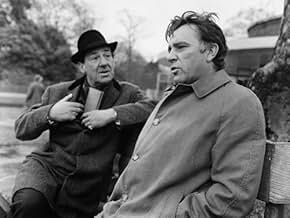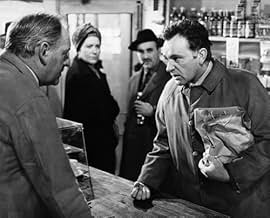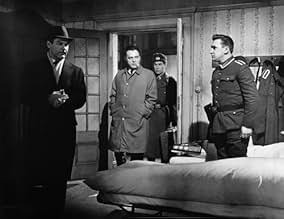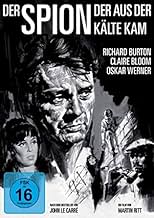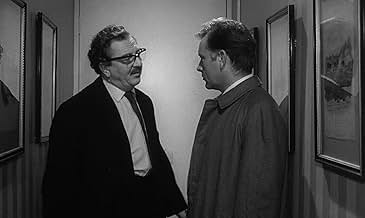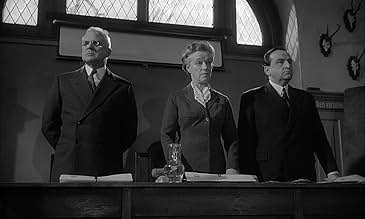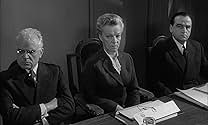L'agente britannico Alec Leamas (Richard Burton) si rifiuta di entrare dalla Guerra Fredda durante gli anni '60, scegliendo di affrontare un'altra missione, che potrebbe rivelarsi la sua ult... Leggi tuttoL'agente britannico Alec Leamas (Richard Burton) si rifiuta di entrare dalla Guerra Fredda durante gli anni '60, scegliendo di affrontare un'altra missione, che potrebbe rivelarsi la sua ultima.L'agente britannico Alec Leamas (Richard Burton) si rifiuta di entrare dalla Guerra Fredda durante gli anni '60, scegliendo di affrontare un'altra missione, che potrebbe rivelarsi la sua ultima.
- Regia
- Sceneggiatura
- Star
- Candidato a 2 Oscar
- 10 vittorie e 5 candidature totali
- Hans-Dieter Mundt
- (as Peter Van Eyck)
Recensioni in evidenza
Burton is cast as Alex Leamas, a nerve-dead, aged secret operative operating out of West Berlin. After a routine assignment goes awry, Leamas is sent home and out of the service. He struggles to try to live a normal, average life as a librarian's assistant, but he can't make it work for him (something that is not helped by his chronic alcoholism). This fact is made forcefully clear when he winds up beating a local grocer and is sentenced to jail time. Slowly but surely, he allows himself to be pulled back into the Cold War he operated in, not suspecting or maybe not even caring that his superiors are setting him up for a fall.
One will never mistake Alex Leamas' grey, rainy world for the sunlight universe of James Bond. It offers what is probably the ugliest depiction of the Great Game on film: drunkards, ex-Nazis, Jews, and die-hard Communists swimming like sharks through a fish pond, all of them devouring any who get in their way. None have any more than lip-service loyalty to their fellow operatives, their countries, or maybe even their own ideologies. At it's center stands Burton, playing Leamas as a walking dead man, festering with hate, resentment, and cynicism at the system that eventually sends him into the gutter. His devastating parked car monologue alone is worth the price of renting this one from the local video store.
It's bitter cynic tone may have been the film's undoing; rarely have I seen a film so downbeat in it's depiction of humanity. Still, it is not one that deserves to be forgotten.
The movie is from the John Le Carre novel and is a hard-nosed look at the world of international espionage and double agents, as different from the Bond movies as night from day.
Stripped of glamour and endless sunshine, Martin Ritt, the director, uses black and white, rain and wind to enhance the story. One could say the cinematography is a character in itself.
There is no distinction here between the good guys and the bad guys. Spies are of themselves irredeemably evil men in the game for their own nefarious purposes, divorced from all that is decent and humane.
Burton's eyes constantly reflect this as he manages to infiltrate the East Communist Bloc and plays the game instigated by his "Control" in London.
Claire Bloom portrays his innocent young girlfriend, naive and pliable. Oskar Werner and Peter Van Eyck play the East Germans fighting for control of Burton's memoirs and each other.
It is hard to be believe that Burton lost his Oscar to Lee Marvin (in Cat Ballou!!) when he so richly deserved it for his once in a lifetime performance in "The Spy--" Cyril Cusack has a wonderful supporting role as "Control" and just about steals his two scenes from Burton. He never disappoints.
I loved this film in the theatre when it was released and subsequent viewings never fail to enthrall me.
8 out of 10.
There are no explosions, no car chases, no sweeping a woman off her feet......just plain, simple story telling.
They always said real spies were less James Bond and more Alec Leamas.
Middle aged, bitter, alone, likely to be divorced, drink too much, politically slightly left of centre.
John Le Carre's The Spy Who Came In from the Cold is noted for maybe showing the true face of spycraft.
On the fringes it has characters like George Smiley. As it goes on, the only person in control is Control. His talk to Leamas about the dirty things the spy services have to do. It is not small talk. It is the literal truth.
Alec Leamas (Richard Burton) messes up an operation in Berlin and is recalled to Britain.
He has been given a new assignment. Leamas has to pretend to have been thrown out by the security services.
It is a ruse for Leamas to come into the attention of British communists and East German intelligence. Be seen as a potential defector.
Leamas is meant to bring down an East German high ranking intelligence officer named Mundt. Leamas finds himself deep of a complex and messy espionage game.
American director Martin Ritt seems to be at ease with such complex material. He makes sure to include a pivotal scene where an important plot point is explained. So many times, espionage films want to leave it dense.
Ritt was left wing and a victim of the McCarthyite witch hunts. Maybe that explained why he was able to identify with an outsider like Leamas and the complex manoeuvrings of the intelligence agencies.
As for Burton, he was already halfway there as the self loathing alcoholic Leamas. The rest was courtesy of a good script and his acting ability.
Lo sapevi?
- QuizAfter Richard Burton became a superstar, he insisted on casting his friends from his days at the Old Vic and West End (London's equivalent to New York City's Broadway). Friends of Burton's cast in this movie included Michael Hordern and Robert Hardy. Burton's former leading lady (on-stage and in two movies) Claire Bloom, however, was cast by Martin Ritt. This caused friction for several reasons: Burton had wanted his wife, Dame Elizabeth Taylor, in the role, and he and Bloom had been an item in the 1950s. John le Carré remembers that "off-screen Bloom preserved a dignified distance in her caravan".
- BlooperAt the beginning of the film they say that Leamas has been waiting for days for the arrival of Riemeck. This behavior doesn't make sense, as it gives away the arrival of a defector to the opposing side.
- Citazioni
Alec Leamas: It was a foul, foul operation, but it paid off.
Nan Perry: Who for?
Alec Leamas: What the hell do you think spies are? Moral philosophers measuring everything they do against the word of God or Karl Marx? They're not! They're just a bunch of seedy, squalid bastards like me: little men, drunkards, queers, henpecked husbands, civil servants playing cowboys and Indians to brighten their rotten little lives. Do you think they sit like monks in a cell, balancing right against wrong? Yesterday I would have killed Mundt because I thought him evil and an enemy. But not today. Today he is evil and my friend. London needs him. They need him so that the great, moronic masses you admire so much can sleep soundly in their flea-bitten beds again. They need him for the safety of ordinary, crummy people like you and me...
Nan Perry: You killed Fiedler!
Alec Leamas: How big does a cause have to be before you kill your friends? What about your Party? There's a few million bodies on that path!
- ConnessioniFeatured in Great Performances: Richard Burton: In from the Cold (1988)
I più visti
Dettagli
- Data di uscita
- Paese di origine
- Sito ufficiale
- Lingue
- Celebre anche come
- Alto espionaje
- Luoghi delle riprese
- Smithfield Market, Dublin, County Dublin, Irlanda(Checkpoint Charlie, Berlin - opening scene: Leamas waits for the agent to come through the border from East Germany)
- Azienda produttrice
- Vedi altri crediti dell’azienda su IMDbPro
Botteghino
- Lordo in tutto il mondo
- 529 USD
- Tempo di esecuzione1 ora 52 minuti
- Colore
- Proporzioni
- 1.85 : 1



